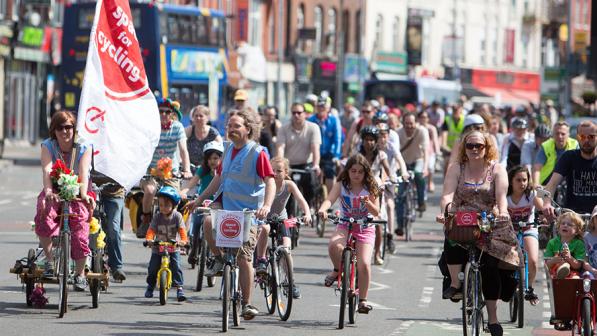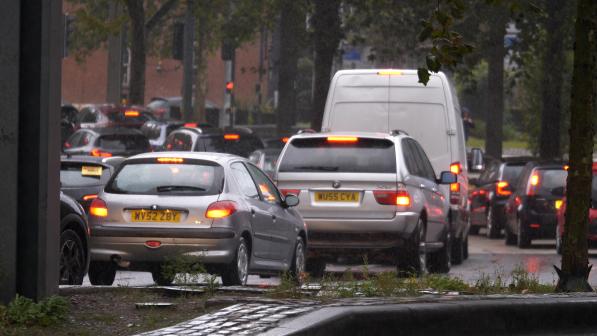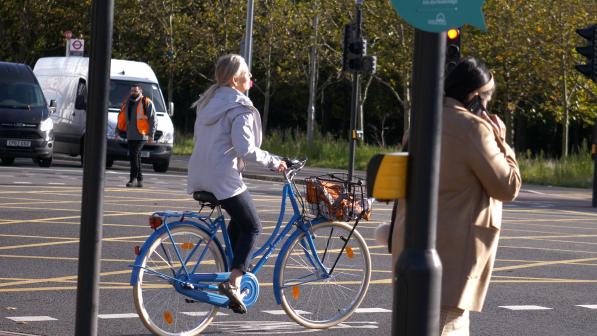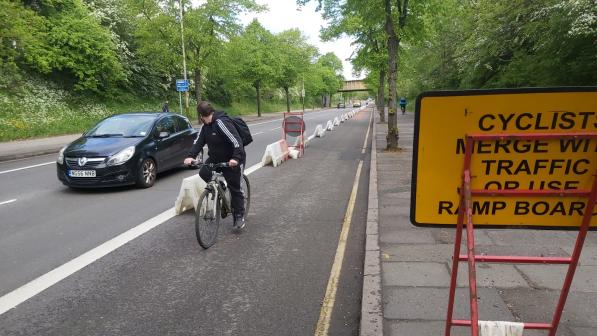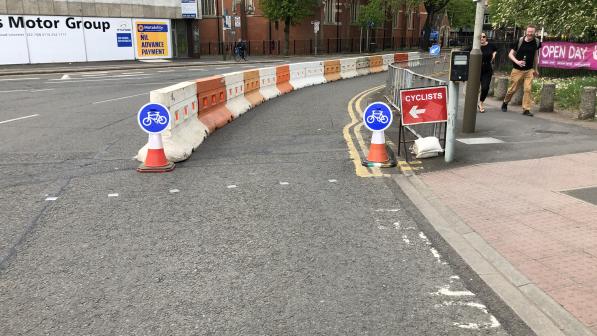Britain’s cities in danger of being overrun by traffic congestion, leading transport experts warn

Although motor traffic on Britain’s roads decreased dramatically at the height of the national lockdown, latest government figures show it is now at almost 100% of pre-Covid levels.2
However, a little more than half of workers (59%) have yet returned to work, with 28% of the workforce still working remotely instead of at their normal place of work.3
Experts fear that as lockdown conditions lift and people go back to work avoiding public transport, busy parts of the country’s road network could be quickly overrun.
Meanwhile, many local authorities have scrapped emergency active travel schemes aimed at increasing cycling and walking, such as pop-up bike lanes and low traffic neighbourhoods, which were intended to ease the pressure on the nation’s roads.
In many cases, councils have removed schemes because a small number of vocal objectors claimed they were causing congestion.
In a paper published in June,4 Rachel Aldred, professor of transport at the University of Westminster, predicted that up to 2.7 million more people who had previously commuted by public transport could switch to travelling by car.
She said: “Rising levels of motor traffic stem from a failure to provide safe alternatives, like a dense network of protected cycle tracks to give people of all ages real choice about how they travel. Without such changes, motor traffic will only grow further as and when lockdowns are relaxed. Do-nothing means more traffic jams, more road injuries, and more pollution.”
Duncan Dollimore, head of campaigns at Cycling UK, said: “To be fair to the government, they predicted congestion and gridlock could be a major problem if people returning to work after the Covid lockdown switched to using their cars.
“That’s why they announced £250m in emergency funding for councils to implement schemes to make it safer and easier for people to walk and cycle if they wanted to avoid public transport.
“Unfortunately, a vocal minority of people and MPs have taken exception to these schemes, blaming them as the sole cause of congestion.”
John Parkin, professor of transport engineering at UWE Bristol, said implementing more cycling and walking infrastructure schemes would ultimately create more liveable cities.
He commented: “A good way of relieving the pressure as a result of this excess of motor vehicles is for as many people as possible to switch to using more efficient forms of travel. For trips of a typical urban length the bicycle offers a highly efficient alternative. A lane the width of a car lane can carry three to five times as many bicycles as cars.
“Cities that have made a transition to less car travel and more travel by bicycle are much more liveable cities.”
Richard Allsop, emeritus professor of transport studies at University College London, said the pandemic had provided the opportunity for a radical reshaping of space on our roads and streets in favour of walking and cycling and the creation of better places to live and work.
But he warned it would mean a stark, and sometimes uncomfortable, choice for many people who would need to consider how they travelled in the future.
He said: “All users of motor vehicles have to find by trial and error how best to make their journeys, and perhaps which to give up making in their vehicles, as they collectively get used to the enhanced – but from their point of view reduced – network.
“This will be a bit uncomfortable for quite a lot of us and really awkward for some. But our share in this discomfort is just our tiny share of the vast price that needs to be faced up to to reduce emissions, decarbonise transport and do our country's bit in keeping climate change manageable for future generations.
“So just as we should be proud to take our share in making lockdown and similar work in enabling the NHS and the economy to hold out until we have a vaccine and time to think how we are going to pay off our new debts, so we should be proud to do our bit to make the reshaped road network work for everyone, even if it’s awkward for us.”
Meanwhile, Dr Steve Melia, senior planning and transport lecturer at UWE Bristol, warned that cities must reduce their motor traffic levels to secure their survival.
Dr Melia said: “These trends are not just threatening the transport system, they are threatening the future of our cities and our countryside. Britain’s population is still rising, despite Brexit.
“The government wants to build 300,000 homes – like a city the size of Sheffield – every year. Since the late 1990s most new housing has been built in large towns and cities. Our cities could house many more people, but not many more cars. It’s a simple question of space.
“As a nation, we have two choices: house more people with fewer cars in towns and cities, or give up and let car-based housing sprawl across the countryside. If we want to avoid that nightmare scenario then we must remove traffic and improve conditions for walking and cycling in urban areas.”
Dr Joshua Vande Hey from the Centre for Environmental Health and Sustainability at the University of Leicester said: “We have to work very hard together to understand the systems-level picture of our cities.
“This means that we have to develop holistic plans for active and public transport infrastructure and connectivity backed by substantial government investment, and make absolutely sure we are not further pressurising disadvantaged groups.
“It also means that rather than blaming each other for our problems that we look carefully at the data behind the problems. An inclusive transformation towards sustainable transportation requires us to consider the complex system we are all part of, and how we can make it better for everyone through a cleaner environment and healthier lifestyles.”
In a YouGov survey4 carried out earlier this year by the BikeIsBest campaign group, 77% of people in Britain supported measures to encourage cycling and walking. And a recent YouGov poll for Greenpeace found that 57% of people supported low traffic neighbourhoods.
Duncan Dollimore at Cycling UK added: “Even before the pandemic, congestion was a serious issue for the UK, costing the economy £6.9billion a year while road users were losing on average 115 hours and £894 a year.
“The simple fact is that we need to make it more appealing for people to cycle and walk, particularly for short journeys, to avoid clogging up our cities with polluting motor traffic. Let’s beat the congestion and let’s get the country moving again, safely, healthily and cheaply, by foot or by bike, helped by restored confidence in using public transport.”
Notes to editors
- Cycling UK, the national cycling charity, inspires and helps people to cycle and keep cycling, whatever kind of cycling they do or would like to do. Over a century’s experience tells us that cycling is more than useful transport; it makes you feel good, gives you a sense of freedom and creates a better environment for everyone. www.cyclinguk.org
- Transport use during the coronavirus (COVID-19) pandemic: Transport use by mode: Great Britain, since 1 March 2020, Department for Transport https://assets.publishing.service.gov.uk/government/uploads/system/uploads/attachment_data/file/928128/COVID-19-transport-use-statistics.ods
- Coronavirus and the economic impacts on the UK: 22 October 2020, Office for National Statistics https://www.ons.gov.uk/businessindustryandtrade/business/businessservices/bulletins/coronavirusandtheeconomicimpactsontheuk/22october2020
- Congestion ahead: a faster route is now available: Post-lockdown mode shift scenarios for commuting in England and Wales, Professor Rachel Aldred, University of Westminster / Possible / Active Travel Academy / KR Foundation
Press contact information
For more information contact the national Cycling UK Press Office on 01483 238 315, 07786 320 713 or email [email protected]
